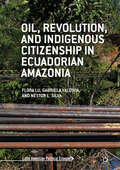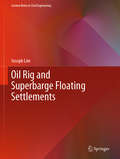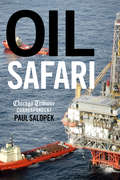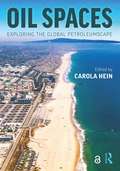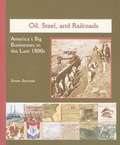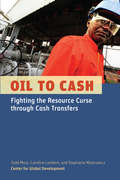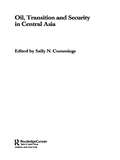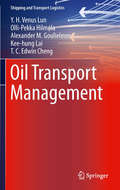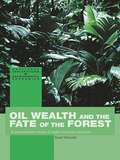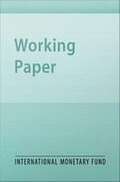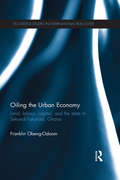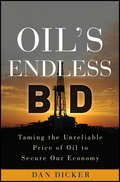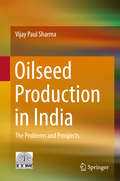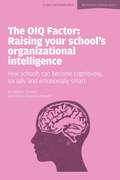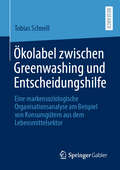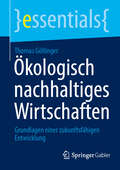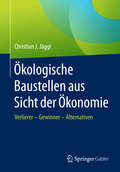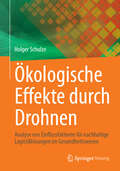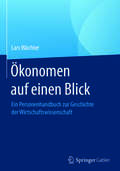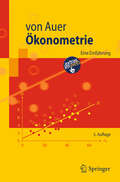- Table View
- List View
Oil, Revolution, and Indigenous Citizenship in Ecuadorian Amazonia
by Gabriela Valdivia Flora Lu Néstor L. SilvaThis book addresses the political ecology of the Ecuadorian petro-state since the turn of the century and contextualizes state-civil society relations in contemporary Ecuador to produce an analysis of oil and Revolution in twenty-first century Latin America. Ecuador's recent history is marked by changes in state-citizen relations: the election of political firebrand, Rafael Correa; a new constitution recognizing the value of pluriculturality and nature's rights; and new rules for distributing state oil revenues. One of the most emblematic projects at this time is the Correa administration's Revoluci#65533;n Ciudadana, an oil-funded project of social investment and infrastructural development that claims to blaze a responsible and responsive path towards wellbeing for all Ecuadorians. The contributors to this book examine the key interventions of the recent political revolution--the investment of oil revenues into public works in Amazonia and across Ecuador; an initiative to keep oil underground; and the protection of the country's most marginalized peoples--to illustrate how new forms of citizenship are required and forged. Through a focus on Amazonia and the Waorani, this book analyzes the burdens and opportunities created by oil-financed social and environmental change, and how these alter life in Amazonian extraction sites and across Ecuador.
Oil Rig and Superbarge Floating Settlements (Lecture Notes in Civil Engineering #82)
by Joseph LimThis book presents a collection of proposed offshore and nearshore settlements in response to the emerging consequences of climate change. These settlements are counterpoints to megacities with unsustainable ecological footprints. The continuing depletion of natural resources has resulted in displaced communities, prompting the following research questions: What if we floated on sea instead of inefficiently consuming land? Could we use wave energy instead of nuclear energy? How can we replenish food supply and regenerate marine eco-diversity? How would our lives be shaped by new offshore settlements? What would we use as structures for shelter, farming, scaffolding and recreation? Floating cities emerged in the 1960s with Buckminster Fuller’s Triton City and Kenzo Tange’s Tokyo Bay Plan, and current manifestations include Vincent Callebaut’s Lilypad, the Seasteading Institute and the mile-long Freedom Ship housing 50,000 people. As an alternative to these examples, the book proposes the repurposing of three types of marine vessel: jack-up platforms, semi-submersibles and superbarges as sustainable, habitable structures to accommodate 20% of the projected 8.1 billion global population in 2025. The spatially conceived floating settlements include food and energy supplies for housing, recreation, education at sea, post-disaster health care and resettlement for nearshore deployment.
Oil Safari
by Paul F. SalopekWould Americans pay more attention to their sources of petroleum-the lifeblood of their car-centric society-if gasoline came with a price tag tallying the explicit human costs of each fill-up? What untold stories of war, poverty and corruption get burned up and expelled from millions of U.S. tailpipes every day? And do false industry assurances that fuel can never be traced from local service stations back to its origins in troubled foreign oil patches help absolve us of responsibility for the wages of our energy addiction?Two-time Pulitzer Prize-winning journalist Paul F. Salopek, a Chicago Tribune foreign correspondent, tackles these questions that are at the heart of Oil Safari: In Search of the Source of America's Fuel. Taken from Salopek's four-part narrative travelogue published in 2006, this book debunks the well-tended industry myth that global oil flows are too complex and fungible to tease apart at a retail outlet.Salopek describes the gripping stories of a diverse cast of characters who are touched by a typical shipment of oil that ends up in the U.S. There is the oil rig worker in the Gulf of Mexico, an Iraqi security consultant, a Nigerian fisherman whose homeland is threatened by drilling, and an indigenous Venezuelan elder who benefits from the country's oil reserves (which are used to fund social programs).Energy policy is at the heart of American politics now more than ever, between the troubling aftermath of the BP Deepwater Horizon oil spill, the burgeoning American surplus of natural gas, and the Obama administration's continued emphasis on renewable energy sources. Oil Safari brings human narratives to the foreground of our energy policy debates and own personal consumption habits.
Oil Spaces: Exploring the Global Petroleumscape
by Carola HeinOil Spaces traces petroleum’s impact through a range of territories from across the world, showing how industrially drilled petroleum and its refined products have played a major role in transforming the built environment in ways that are often not visible or recognized. Over the past century and a half, industrially drilled petroleum has powered factories, built cities, and sustained nation-states. It has fueled ways of life and visions of progress, modernity, and disaster. In detailed international case studies, the contributors consider petroleum’s role in the built environment and the imagination. They study how petroleum and its infrastructure have served as a source of military conflict and political and economic power, inspiring efforts to create territories and reshape geographies and national boundaries. The authors trace ruptures and continuities between colonial and postcolonial frameworks, in locations as diverse as Sumatra, northeast China, Brazil, Nigeria, Tanzania, and Kuwait as well as heritage sites including former power stations in Italy and the port of Dunkirk, once a prime gateway through which petroleum entered Europe. By revealing petroleum’s role in organizing and imagining space globally, this book takes up a key task in imagining the possibilities of a post-oil future. It will be invaluable reading to scholars and students of architectural and urban history, planning, and geography of sustainable urban environments.
Oil, Steel, and Railroads: America's Big Businesses in the Late 1800s (America's Industrial Society in the 19th Century Ser.)
by Jesse JarnowExamines the history of business in the United States during the 1800s, discussing the growth of railroads, and the innovations in the oil and steel industries.
Oil Tanker Shipping Industry in 1983
by Richard Rawlinson Michael E. PorterDescribes the international oil tanker shipping industry both historically and in 1983. Designed to provide a vehicle for practicing industry analysis in a volatile commodity business, and for formulating strategy in such an environment. Also can be used to examine industry capacity overexpansion and vertical integration policies of oil companies who own some but not all of the ships they use to transport their oil.
Oil to Cash: Fighting the Resource Curse Through Cash Transfers
by Caroline Lambert Todd Moss Stephanie MajerowiczWhat should a country do if it suddenly discovers oil and gas? How should it spend the subsequent cash windfall? How can it protect against corruption? How can citizens truly benefit from national wealth? With many of the world's poorest and most fragile states suddenly joining the ranks of oil and gas producers, these are pressing policy questions. Oil to Cash explores one option that may help avoid the so-called resource curse: just give the money directly to citizens. A universal, transparent, and regular cash transfer would not only provide a concrete benefit to regular people, but would also create powerful incentives for citizens to hold their government accountable. Oil to Cash details how and where this idea could work and how policymakers can learn from the experiences with cash transfers in places like Mexico, Mongolia, and Alaska.
Oil, Transition and Security in Central Asia
by Sally CummingsApproaching Central Asia from the perspective of geopolitics, transition, oil and stability, the authors provide a very broad and diverse analysis of the region, examining domestic and international developments since 1991. The book both provides an introduction to the region and presents advanced research on international pipeline projects, political risk and developments after September 11th. The authors draw on a variety of disciplines, including economics, politics, international relations, law and sociology.
Oil Transport Management
by Kee-Hung Lai Alexander M. Goulielmos T.C. Edwin Cheng Olli-Pekka Hilmola Y.H. Venus LunThe first volume in a new Springer Series on Shipping and Transport Logistics, Oil Transport Management provides a full historical account of the evolution of the oil transport industry since the 1800's. In this comprehensive guide, the authors investigate the industry and describe the shipping market and its structure, as well as forecasting, location plan and the transportation chain. They dedicate a separate chapter to each topic to cover various concepts, including: an introduction to the tanker shipping market, including how the freight, new vessel building, second hand and demolition markets influence one another, the economic structure and organization of the tanker industry in both the past and present, and forecasting the need for oil-based sea transportation. Further chapters present case studies and simulations to illustrate the importance of factory location decisions and the need for oil infrastructure investments. Chapter One also includes a regression equation to predict the fleet size in tanker shipping. Oil Transport Management is a key reference, which can be practically applied to wider global research and practices. Ideal for both industry practitioners, and researchers and students of shipping studies, Oil Transport Management provides a concise yet comprehensive coverage of the oil transport industry's history and a guide for its future development.
Oil Wealth and the Fate of the Forest: A Comparative Study of Eight Tropical Countries (Routledge Explorations in Environmental Economics #Vol. 2)
by Sven WunderReduction in the size of the world's remaining rainforests is an issue of huge importance for all societies. This new book - an analysis of the impact of oil wealth on tropical deforestation in South America, Africa and Asia - takes a much more analytical approach than the usual fare of environmental studies. The focus on economies as a whole leads to a more balanced view than those that are often put forward and therefore, vitally, a view that is more valid. Of use to those who study environmental issues and economics, this book is potentially an indispensable tool for policy-makers the world over.
Oil Windfalls in Ghana: A DSGE Approach
by Jihad Dagher Jan Gottschalk Rafael PortilloA report from the International Monetary Fund.
Oiling the Urban Economy: Land, Labour, Capital, and the State in Sekondi-Takoradi, Ghana (Routledge Studies in International Real Estate)
by Franklin Obeng-OdoomThis book presents a critical analysis of the ‘resource curse’ doctrine and a review of the international evidence on oil and urban development to examine the role of oil on property development and rights in West Africa’s new oil metropolis - Sekondi-Takoradi, Ghana. It seeks answers to the following questions: In what ways did the city come into existence? What changes to property rights are oil prospecting, explorations, and production introducing in the 21st century? How do the effects vary across different social classes and spectrums? To what extent are local and national institutions able to shape, restrain, and constrain trans-national oil-related accumulation and its effects on property in land, property in housing (residential, leisure, and commercial), and property in labour? How do these processes connect with the entire urban system in Ghana? This book shows how institutions of varying degrees of power interact to govern land, housing, and labour in the city, and analyses how efficient, sustainable, and equitable the outcomes of these interactions are. It is a comprehensive account of the tensions and contradictions in the main sectors of the urban economy, society, and environment in the booming Oil City and will be of interest to urban economists, development economists, real estate economists, Africanists and urbanists.
Oil's Endless Bid: Taming the Unreliable Price of Oil to Secure Our Economy
by Dan DickerExpert analysis of rising oil prices and the out-of-control oil markets that jeopardize both national security and the economy The price of oil is negatively impacting both companies and consumers. <P><P>In Oil's Endless Bid: Taming the Unreliable Price of Energy to Secure Our Economy, energy analyst Dan Dicker recalls his experiences as an oil trader and reveals the changes that have taken place in the oil markets during the past twenty years, and particularly the last five, as investment banks, energy hedge funds, and managed futures funds have come to dominate energy trading and wreak havoc on prices. Reveals why oil prices cannot stabilize without dramatic action on the part of both government and business Details how the novel, but wrong, idea of oil as an asset class took a sleepy, club-like market into the national spotlight Describes how the United States is unnecessarily handing its wealth over to foreign oil producers during a time when the potential supply of oil is greater than ever Written by an industry insider, Oil's Endless Bid analyzes the biggest financial story of the last ten years?how we lost control of our oil markets.
Oilseed Production in India
by Vijay Paul SharmaThis book analyses the performance and potential of India's oilseed sector, identifies the major constraints facing the industry and suggests options for increasing the country's oilseed production and productivity, taking into account the changing policy environment, increasing demand, slow growth in domestic production and rising imports. India as the world's largest producer of oilseeds, accounts for about 7-8 per cent of global vegetable oil production. However, the growth in domestic production has not kept pace with the growth in demand. Low yields and high production and market risks due to lack of irrigation facilities and effective risk management have been responsible for widening the demand-supply gap over the years, and the country now imports more than half of its oilseed for domestic consumption. The Technology Mission on Oilseeds (TMO), launched in the mid-1980s, helped achieve self-sufficiency in edible oil production through the spread of technology and the provision of market support. However, increasing demand for edible oils necessitated imports in large quantities, leading to a substantial drain on foreign exchange. Given the competing demands on agricultural land from various crops and enterprises, the production of oilseeds can be increased only if productivity is improved significantly and farmers receive remunerative prices and have assured market access. However, farmers face various constraints in oilseed production; several biotic, abiotic, technological, institutional and socio-economic constraints inhibit exploitation of the full yield potential of crops, which need to be addressed. The book explores these issues using data collected from about 2,000 oilseed growers: 490 soybean farmers, 316 rapeseed-mustard growers, 470 groundnut farmers, 250 sesamum farmers and 470 sunflower growers from selected Indian states. It would be of immense use for scholars and policy makers alike who are working in this field.
The OIQ Factor: Raising Your School's Organizational Intelligence: How Schools Can Become Cognitively, Socially and Emotionally Smart (World Class Schools)
by Ochan Kusuma-Powell William PowellThis fascinating book, written by two experts in school improvement, is for teachers and school leaders who are looking for ways to raise the organizational intelligence quotient (OIQ) of their classrooms and their schools. It is ideal for those who perceive themselves as the facilitators of learning - for students, for colleagues and for themselves. If schools are to be transformed and transformative, teacher-learners will lead the way. Simplistic and superficial approaches to improving student learning simply don't work. School improvement isn't a technical challenge; it is an adaptive one. It requires a change not just in behaviors and skills, but in values, beliefs and even identity.
The OIQ Factor: Raising Your School's Organizational Intelligence: How Schools Can Become Cognitively, Socially and Emotionally Smart (World Class Schools)
by William Powell Ochan Kusuma-PowellThis fascinating book, written by two experts in school improvement, is for teachers and school leaders who are looking for ways to raise the organizational intelligence quotient (OIQ) of their classrooms and their schools. It is ideal for those who perceive themselves as the facilitators of learning - for students, for colleagues and for themselves. If schools are to be transformed and transformative, teacher-learners will lead the way. Simplistic and superficial approaches to improving student learning simply don't work. School improvement isn't a technical challenge; it is an adaptive one. It requires a change not just in behaviors and skills, but in values, beliefs and even identity.
Ökolabel zwischen Greenwashing und Entscheidungshilfe: Eine markensoziologische Organisationsanalyse am Beispiel von Konsumgütern aus dem Lebensmittelsektor
by Tobias SchnellÖkolabel konstruieren Markenprodukte als nachhaltig.Markensysteme erhöhen durch Ökolabel ihre Kommunikationserfolge und bauen so ein grünes Markenimage auf. Daher können Ökolabel den Konsument*innen als ein effizientes Kommunikationsmittel begegnen, das beim Einkauf Orientierung gibt. Was als Entscheidungshilfe dient, kann von Unternehmen auch zum Greenwashing verwendet werden.Die dahinterliegenden Prozesse werden hier markensoziologisch aufgeschlüsselt und Ökolabel dadurch erstmals soziologisch erfasst.In diesem Buch entwickelt Tobias Schnell ein Markensystem, welches Ökolabel als integralen Teilbereich grüner Systeme versteht und Markenorganisationen dadurch greif- und steuerbar macht. Der Autor Tobias Schnell ist wissenschaftlicher Mitarbeiter am Institut für Sozialwissenschaften, Fach Soziologie an der Christian-Albrechts-Universität zu Kiel. Er lehrt und forscht dort zu den Themen des nachhaltigen Konsums, der Markensoziologie, sowie zu empirischen Methoden der Sozialforschung.
Ökologisch nachhaltiges Wirtschaften: Grundlagen einer zukunftsfähigen Entwicklung (essentials)
by Thomas GöllingerIn diesem essential werden die wichtigsten Grundlagen des ökologisch nachhaltigen Wirtschaftens erläutert. Nach einer kompakten Klärung der verschiedenen Verständnisse und Bedeutungen von „Nachhaltigkeit“ und „Nachhaltiger Entwicklung“ erfolgt eine Darlegung der prinzipiellen Problematik im Kontext von Ökologie und Ökonomie. Eine Erörterung der diversen Handlungsfelder und Strategieoptionen zeigt die vielfältigen Möglichkeiten bezüglich Effizienz-, Konsistenz- und Suffizienz-Innovationen auf. Schließlich erfolgt ein Blick auf die aktuellen Herausforderungen des Nachhaltigkeitsmanagements.
Ökologisch-ökonomische und sozio-ökologische Strategien zur Erhaltung der Wälder: Ein transdisziplinärer Ansatz mit Fokus auf Chile und Brasilien
by Felix Fuders Pablo J. DonosoIn diesem Buch werden Strategien zur Verbesserung der Widerstandsfähigkeit und des Schutzes der gemäßigten Wälder in Südamerika vorgeschlagen, damit diese Wälder auf nachhaltige Weise Ökosystemleistungen erbringen können. Als solches trägt es zum Entwurf eines widerstandsfähigen Mensch-Wald-Modells bei, das die Multikulturalität lokaler Gemeinschaften berücksichtigt und in vielen Fällen Aspekte der ökologischen Ökonomie, der Entwicklungsökonomie und der territorialen Entwicklungsplanung einbezieht, die mit indigenen Völkern oder „First Nations“ zu tun haben. Darüber hinaus werden Vorschläge für öffentliche und territoriale Politiken unterbreitet, die den Erhaltungszustand der einheimischen Wälder und Waldökosysteme verbessern, und zwar auf der Grundlage einer kritischen Analyse der wirtschaftlichen Faktoren, die zur Degradierung der Waldökosysteme im heutigen Südamerika führen.Dieses Buch wurde von Mitgliedern des Transdisziplinären Forschungszentrums für soziale und ökologische Strategien zur nachhaltigen Waldbewirtschaftung in Südamerika an der Universidad Austral de Chile konzipiert. Es enthält Beiträge von renommierten Forschern aus der ganzen Welt, die die Bereiche Wirtschaft, Ökologie, Biologie, Anthropologie, Soziologie und Statistik miteinander verbinden. Es handelt sich jedoch nicht einfach um eine Sammlung von Arbeiten, die von Autoren aus verschiedenen Disziplinen verfasst wurden. Vielmehr erhebt jedes Kapitel den Anspruch, in sich selbst transdisziplinär zu sein. Dieser Ansatz macht das Buch zu einem einzigartigen Beitrag zur Verbesserung sozialer, betriebswirtschaftlicher und politischer Ansätze in der Waldbewirtschaftung, die dazu beitragen, die Ökosystemleistungen des Waldes zu schützen und nachhaltiger zu gestalten. Dies wiederum kommt den lokalen Gemeinschaften und der Gesellschaft als Ganzes zugute, indem die negativen externen Effekte der Forstwirtschaft verringert und die Zukunftschancen verbessert werden.
Ökologische Baustellen aus Sicht der Ökonomie
by Christian J. JäggiDieses Fachbuch beschäftigt sich mit ökologischen Fragestellungen, die in der öffentlichen Diskussion zu wenig Beachtung finden. In vielen Bereichen bleiben die Lösungsansätze und geforderten Maßnahmen eigenartig vage oder werden einseitig ökonomischen Sachzwängen oder Partikularinteressen unterordnet. Der Autor thematisiert exemplarisch unter anderem Probleme der Mobilität, des Lärms und des Elektrosmogs. Dabei wird immer gefragt, wer ökonomisch von diesen Baustellen und der heutigen Situation profitiert und wer die Kosten bezahlt. Konkret zeigt sich das im Gesundheitsbereich, der einerseits einen wachsenden Markt darstellt, anderseits aber auch hohe Kosten verursacht. Schließlich werden mögliche Strategien und Lösungsansätze diskutiert.
Ökologische Effekte durch Drohnen: Analyse von Einflussfaktoren für nachhaltige Logistiklösungen im Gesundheitswesen
by Holger SchulzeSeit 2005 beschäftigt sich der Autor mit Drohnentechnologien. Aber erst seit etwa zehn Jahren kann sich das Drohnen-Business in Deutschland und Europa, bedingt durch die veränderten rechtlichen Rahmenbedingungen und unterstützt durch den politischen Willen, als selbsttragendes Geschäftsfeld entwickeln. Als Gesellschafter-Geschäftsführer eines Drohnenunternehmens hat der Autor in den Jahren 2019 bis 2023 im Rahmen des Antrags auf Zulassung eines Regelflugbetriebs im Bereich der medizinischen Logistik die dafür notwendigen technischen, ökonomischen und ökologischen Konzepte entwickelt. Die im Zulassungsantrag eingereichten Unterlagen dienten der Luftfahrtbehörde als Grundlage für die im Jahr 2023 erteilte Betriebsgenehmigung. Diese Zulassung erfolgte für einen Regelflugbetrieb in der höheren Risikoklasse SAIL III und schloss als erste Betriebsgenehmigung in Europa Drohnenflüge auch über bewohnten Gebieten ein. Die Vorteile des Einsatzes unbemannter Luftfahrzeuge in der medizinischen Logistik liegen auf der Hand: Stichworte wie Geschwindigkeitsvorteil, grüne Logistik und Kostenreduzierung werden oft als Argumente angeführt. Auch wenn hinter das Stichwort „Kostenreduzierung&“ derzeit noch ein großes Fragezeichen zu setzen ist, kann mit dem Einsatz von Drohnen die Logistik im Gesundheitswesen zumindest deutlich flexibler organisiert werden. Eine der Fragen im Antragsverfahren betraf die Umweltverträglichkeit von Drohnenflügen. Umfangreiche Literaturrecherchen und die Auswertung von Forschungsergebnissen ergaben, dass zu diesem Thema noch keine hinreichend praxisrelevanten Ergebnisse vorliegen. Aus diesem Grund fasst die vorliegende Publikation die im Rahmen des Zulassungsverfahrens durchgeführten Recherchen, Untersuchungen und Tests zusammen. Dabei wird eine Systematik angewendet, die Umwelteinflüsse von Drohnenflügen wesentlich komplexer als bisherige Untersuchungen betrachtet. Anstatt allein die CO2-Re-duktion im Vergleich zum Transport von medizinischem Material auf der Straße zu betrachten, kommt ein gesamtheitlicher und vor allem praxisorientierter Ansatz zum Tragen. Um die geringen Auswirkungen von Drohnenflügen auf die Tierwelt nachzuweisen, wurden über 600 Drohnenflüge ausgewertet und Reaktionen von Tieren ermittelt. Wesentliche Inhalte des Buches sind: die Betrachtung von Grundlagen im Bereich des Umweltschutzes und Darstellung einer Auswahl relevanten Datenbestände und Informationsquellen. eine strukturierte Darstellung von unterschiedlichen Bauformen unbemannter Luftfahrzeuge eine Analyse der derzeitigen Entwicklungsrichtungen im Bereich von Drohnen und der für die Antriebe eingesetzten Energieträger eine Darstellung mit dem Transport von Gefahrstoffen verbundenen Herausforderungen in der auf Drohnen basierenden Logistik sowie eine Untersuchung des Einflusses von Drohnenflügen auf die Tierwelt und Vorschläge für die Umsetzung einer umweltschonenden Flugplanung.
Ökonomen auf einen Blick
by Lars WächterDieses Handbuch bietet sowohl einen Einstieg als auch einen Überblick zu Leben, Werk und Wirkung bedeutender Ökonomen der Vergangenheit und der Gegenwart - von antiken Vordenkern der Ökonomie bis hin zu Wirtschaftsnobelpreisträgern. Dabei werden auch Ökonomen abseits der „Mainstream-Ökonomie“ beleuchtet. Die Artikel klären erste Fragen zur Person, stellen den wissenschaftlichen Werdegang dar und erläutern die Theorien und Ideen des jeweiligen Ökonomen in verständlicher und strukturierter Art und Weise. Hierbei legt der Autor ein besonderes Augenmerk darauf, die Wirtschaftsdenker bei der Darstellung ihrer Theorien mittels gehaltvoller Leseproben aus ihren Werken selbst zu Wort kommen zu lassen. Auf diese Weise erhält der Leser einen umfassenden und inspirierenden Einblick in die Geschichte des ökonomischen Denkens. Der Inhalt Eine kurze Geschichte der Ökonomik (Volkswirtschaftslehre, Betriebswirtschaftslehre) Bedeutende Ökonomen Zeittafel zur Literaturgeschichte der Ökonomie Glossar Der Autor Lars Wächter ist Diplom-Handelslehrer und Verfasser zahlreicher Publikationen aus den Bereichen der Berufsausbildung, der VWL, der BWL und dem Wirtschaftsrecht.
Ökonomen auf einen Blick: Ein Personenhandbuch zur Geschichte der Wirtschaftswissenschaft
by Lars WächterDieses Handbuch bietet sowohl einen Einstieg als auch einen Überblick zu Leben, Werk und Wirkung bedeutender Ökonomen der Vergangenheit und der Gegenwart - von antiken Vordenkern der Ökonomie bis hin zu Wirtschaftsnobelpreisträgern. Dabei werden auch Ökonomen abseits der „Mainstream-Ökonomie“ beleuchtet. Die Artikel klären erste Fragen zur Person, stellen den wissenschaftlichen Werdegang dar und erläutern die Theorien und Ideen des jeweiligen Ökonomen in verständlicher und strukturierter Art und Weise. Hierbei legt der Autor ein besonderes Augenmerk darauf, die Wirtschaftsdenker bei der Darstellung ihrer Theorien mittels gehaltvoller Leseproben aus ihren Werken selbst zu Wort kommen zu lassen. Auf diese Weise erhält der Leser einen umfassenden und inspirierenden Einblick in die Geschichte des ökonomischen Denkens.Die 2. Auflage wurde aktualisiert, erweitert und durch die Vorstellungen neun weiterer bedeutender Ökonomen ergänzt.
Ökonometrie: Eine Einführung (Springer-Lehrbuch)
by Ludwig AuerDieses Lehrbuch bietet eine praxisorientierte Einführung in die Methoden der Ökonometrie. Angesichts der zunehmenden Bedeutung der empirischen Analyse in Wissenschaft und Praxis will das Buch die Ökonometrie aus ihrer formal-mathematischen Ecke herausholen und einem breiteren Interessentenkreis zugänglich machen. In der Konzeption des Lehrbuches erhielt deshalb didaktisches Profil grundsätzlich Vorrang vor wissenschaftlicher Eleganz. Unterstützt durch zahlreiche Illustrationen, ausführliche verbale Erläuterungen und begleitende numerische Beispiele werden sowohl die ökonometrischen Grundlagen als auch anspruchsvollere Themenbereiche in gut verständlicher Art und Weise aufbereitet. Das Lehrbuch kommt ohne den Einsatz von Matrixalgebra aus. Ambitionierte Leser finden jedoch in den jeweiligen Kapitelanhängen ausführliche matrixalgebraische Darstellungen des behandelten Materials.
Ökonometrie in Theorie und Praxis: Analyse von Querschnitt-, Zeitreihen- und Paneldaten mit Stata 15.1
by Panchanan DasDieses Buch führt in die ökonometrische Analyse von Querschnitts-, Zeitreihen- und Paneldaten unter Anwendung statistischer Software ein. Es dient als Grundlagentext für diejenigen, die ökonometrische Analysen in der empirischen Forschung erlernen und anwenden wollen. Das Niveau der Darstellung ist so einfach wie möglich gehalten, um es sowohl für Studenten im Grundstudium als auch für Doktoranden nützlich zu machen. Es enthält mehrere Beispiele mit realen Daten und Stata-Programmen sowie die Interpretation der Ergebnisse. Bei der Diskussion der statistischen Instrumente, die zum Verständnis der empirischen Wirtschaftsforschung erforderlich sind, versucht das Buch, ein Gleichgewicht zwischen Theorie und angewandter Forschung herzustellen. Verschiedene Konzepte und Techniken der ökonometrischen Analyse werden durch sorgfältig entwickelte Beispiele unter Verwendung des statistischen Softwarepakets Stata 15.1 unterstützt, wobei vorausgesetzt wird, dass der Leser mit der Software Strata einigermaßen vertraut ist.
